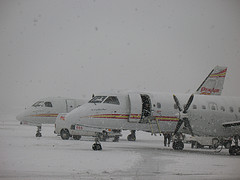6 Smart Packing Tips for Winter Weather Travel Delays
22 February 2013
With all the the recent winter storm travel delays, we started to think about what kinds of things are appropriate to pack and/or do ahead of time in case of winter weather travel delays and emergencies. Winter weather patterns have dramatically affected air, train, and road travel this year, and in order to be prepared, we researched the top packing tips for winter delays.
1. Try to stay one step ahead of the weather – if you can
While we’d all love to be able to book a direct flight every single time, it’s not always an option or affordable.
- If it looks like your connection is in the path of the storm, call the airline and see if it’s possible to switch your connecting flight.
- If it looks like you may be delayed, contact your hotel and other travel suppliers and warn them of the situation. Often, they appreciate this and will refund you for the day you lost simply because they had advanced warning.
If you remember the domino effect – bad weather in one area creates problems that ripple through the airline system – you’ll remember to check your connections and try to stay ahead of the weather.
2. Pack a carry-on with every thing you need for 24-48 hours
Now, this could seem like a daunting task, but remember we said ‘everything you need’ goes in this bag, not necessarily everything you want. Don’t worry though with a little practice, you should be able to toss in some wanted items as well.
- Your travel documents (including your travel insurance plan documentation), see these tips for the best travel document backup methods
- At least a partial change of clothing (think underwear and a clean shirt)
- All medications, see our checklist for traveling with medications
- Basic toiletries: hand sanitizer, toothpaste/toothbrush, deodorant and contact lens solution (for rinsing at the very least)
After all that, you should still have room for the necessary electronics, laptop/tablet, cell phone, e-reader, etc. and don’t forget the chargers!
3. Store hotel, airline, and other important numbers
You’ll want to be sure to have the phone numbers you need to avoid further delays when your travel is temporarily halted.
- Sign up for the travel alerts from your airline and program their numbers into your phone with your frequent flyer info. If your flight is cancelled, you can make a call while heading to the customer service counter and get help quickly. Standing in the customer service line lets you retrieve your luggage (if possible), pick up any food or hotel vouchers, and hear verbal updates.
- If you’re a member of a hotel’s frequent guest program, have those details as well as their number – this can help you score a hotel room before they’re all sold out.
- If you purchased travel insurance, have that information in your travel documents list and you’ll have the help you need to get on another flight, get a hotel, etc. depending on what your plan offers.
If you had hotel reservations at your destination, you’ll want to call the hotel and let them know you won’t be coming due to a weather delay. Be nice on the phone and they may let you off the hook and give you a refund if you had non-refundable reservations.
4. Split suitcases if traveling with another
If you’re traveling with someone else, put one days’ worth of clothing into the other person’s bag and vice versa. If one of the bags is lost, you’ll still be comfortable in your own clothes and you’ll have your carry-on with your toiletries, etc. If both bags are lost, then we hope you remembered to buy baggage insurance.
5. Buy travel insurance and know how it works
Travel insurance coverage for travel delays reimburses you for additional meals, accommodations, and other expenses when a trip’s departure is delayed for a covered reason. That last part is important because the reason for the delay must be covered in the plan. Also, most travel insurance plans define a per-day maximum and a minimum number of hours the insured must be delayed before they can be reimbursed.
See our full review of travel delay coverage to better understand how it works.
6. These items may not be for everyone, but we like them
The following items may not be useful for everyone, but there are a bunch of reasons we like to consider them when we’re traveling:
- A light throw – many travelers like to toss in a light throw for staying warm in cold airports or on cold planes. This handy item can be rolled up and used as a pillow or thrown over your head to shield from noise and light if you need a nap.
- Snacks – when food courts are packed and lines are long, having some granola bars, nuts, trail mix and other portable snacks can make a big difference in how you feel during your delay. When you’re traveling with kids, these can be absolutely essential.
- A refillable water bottle – you can’t get water through security, but you can get it on the other side and fresh drinkable water is critical for staying hydrated and comfortable. We never leave without one of these in our packs. Drink it down before security, fill it up after. Never go thirsty.
Damian Tysdal is the founder of CoverTrip, and is a licensed agent for travel insurance (MA 1883287). He believes travel insurance should be easier to understand, and started the first travel insurance blog in 2006.

